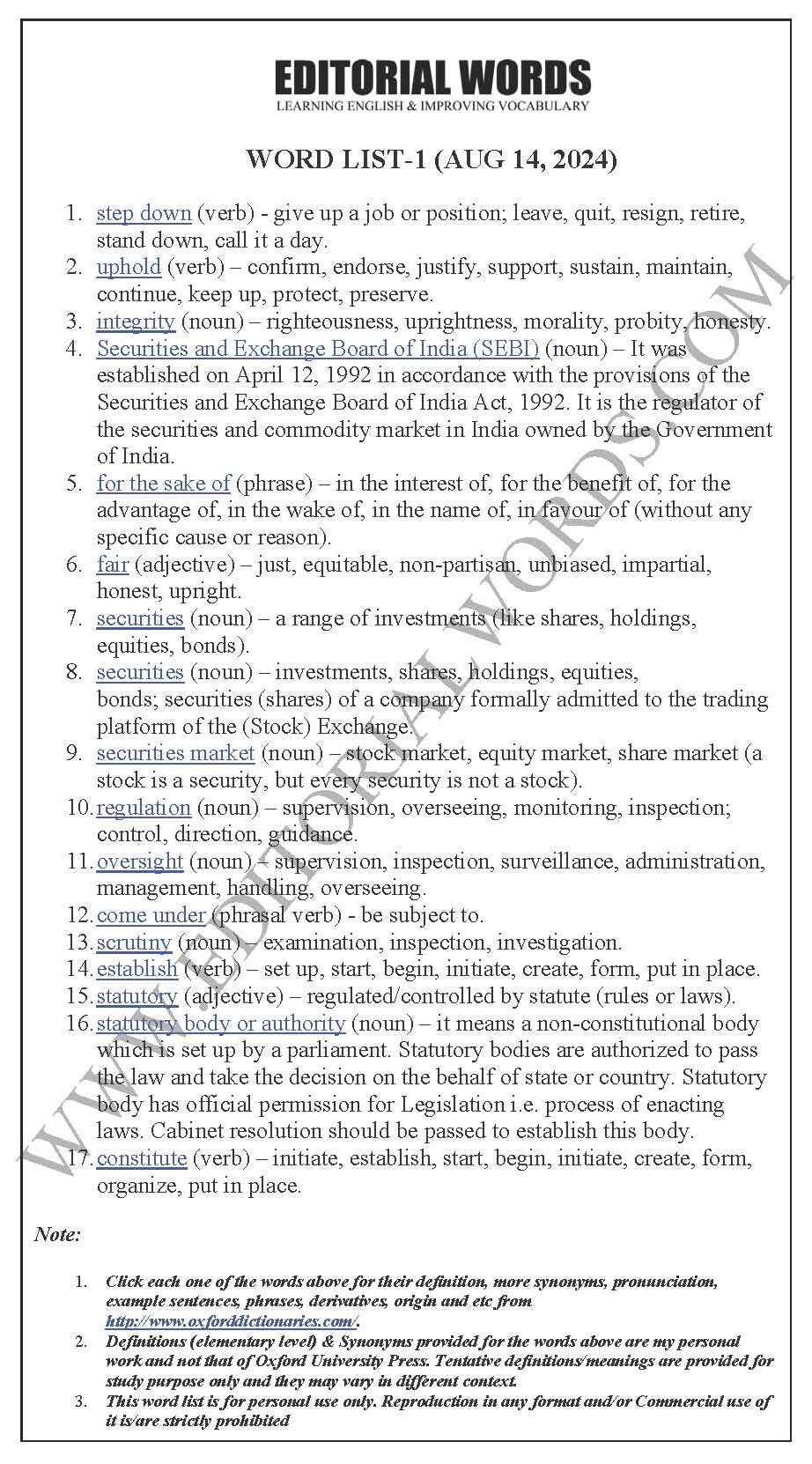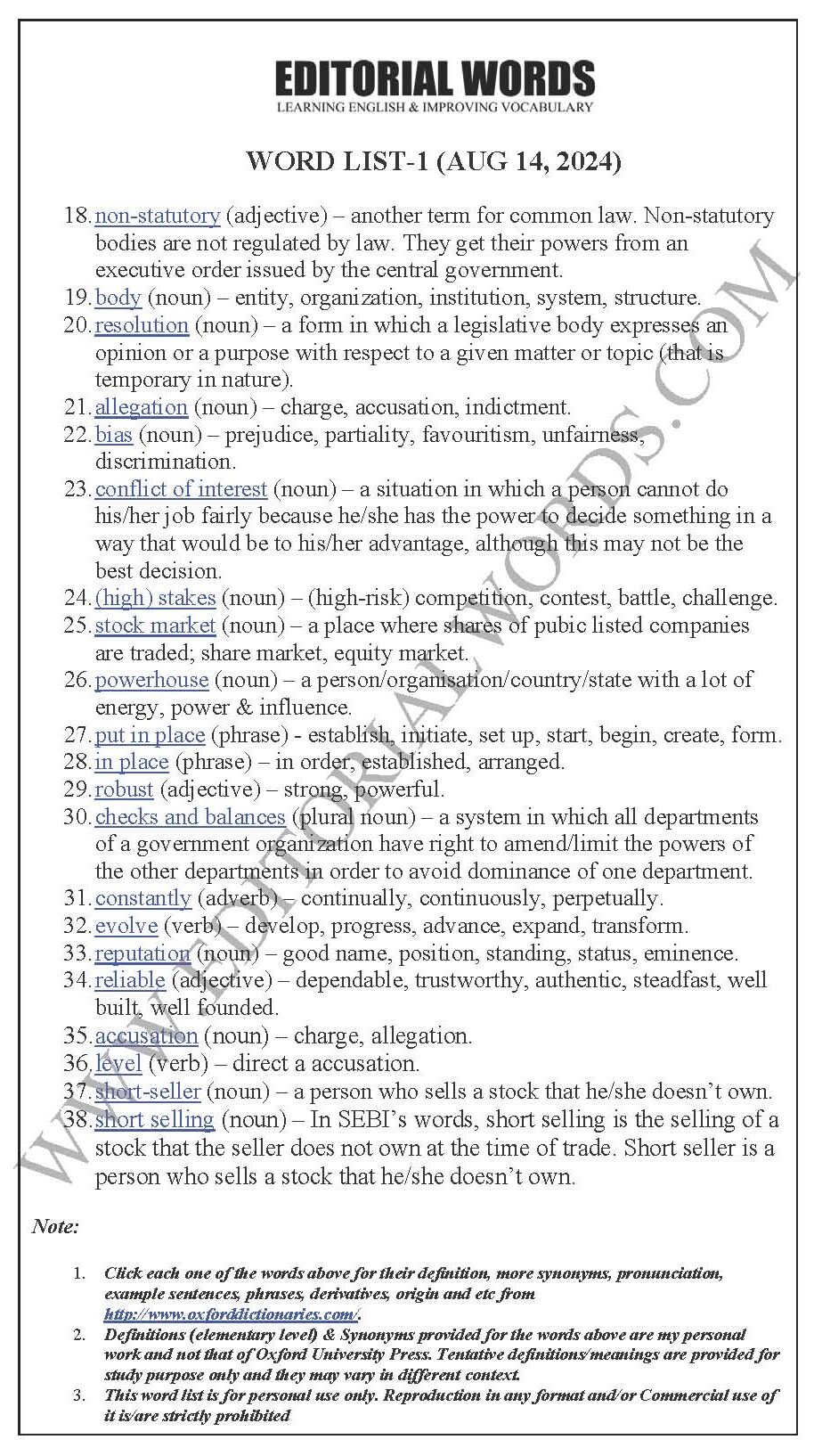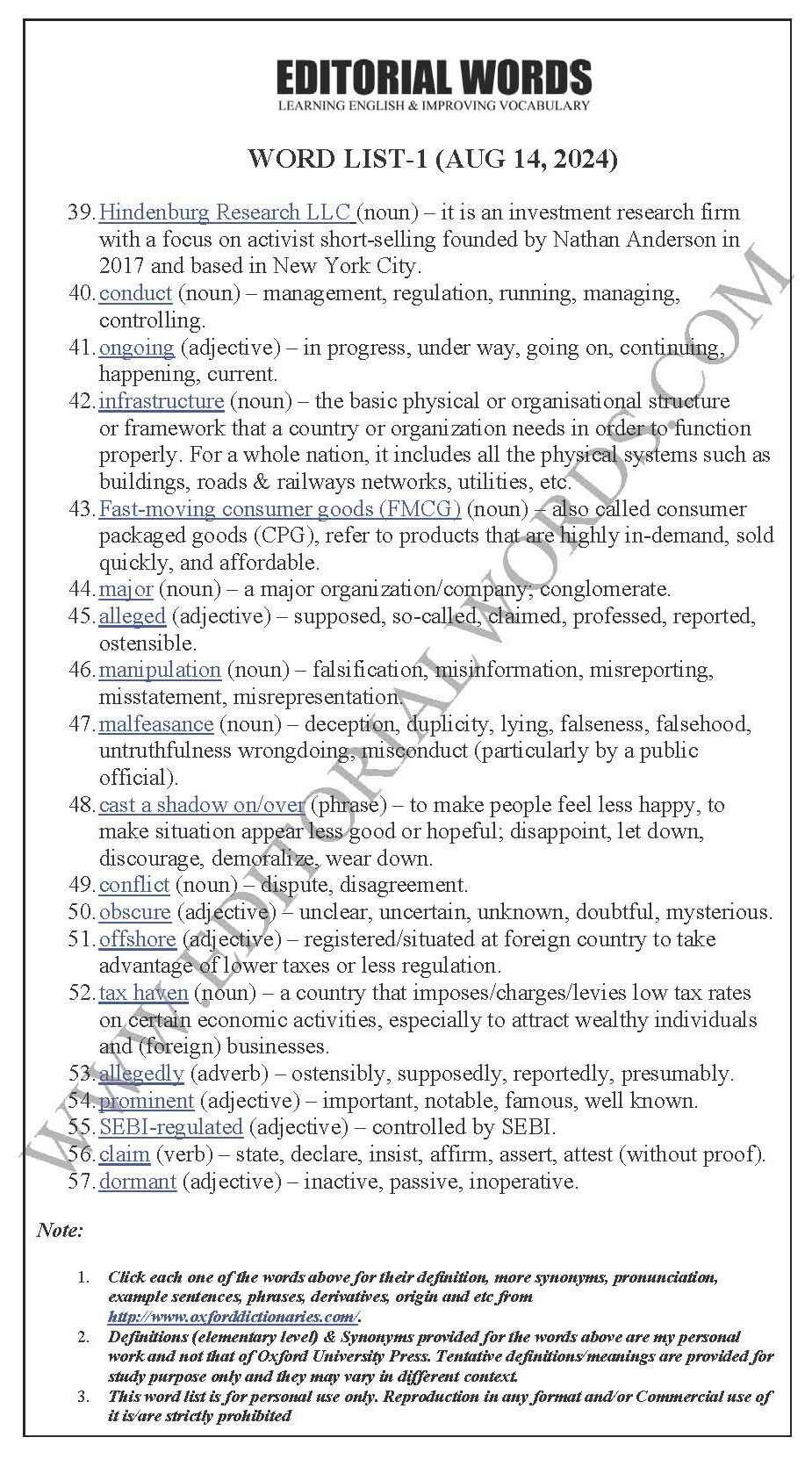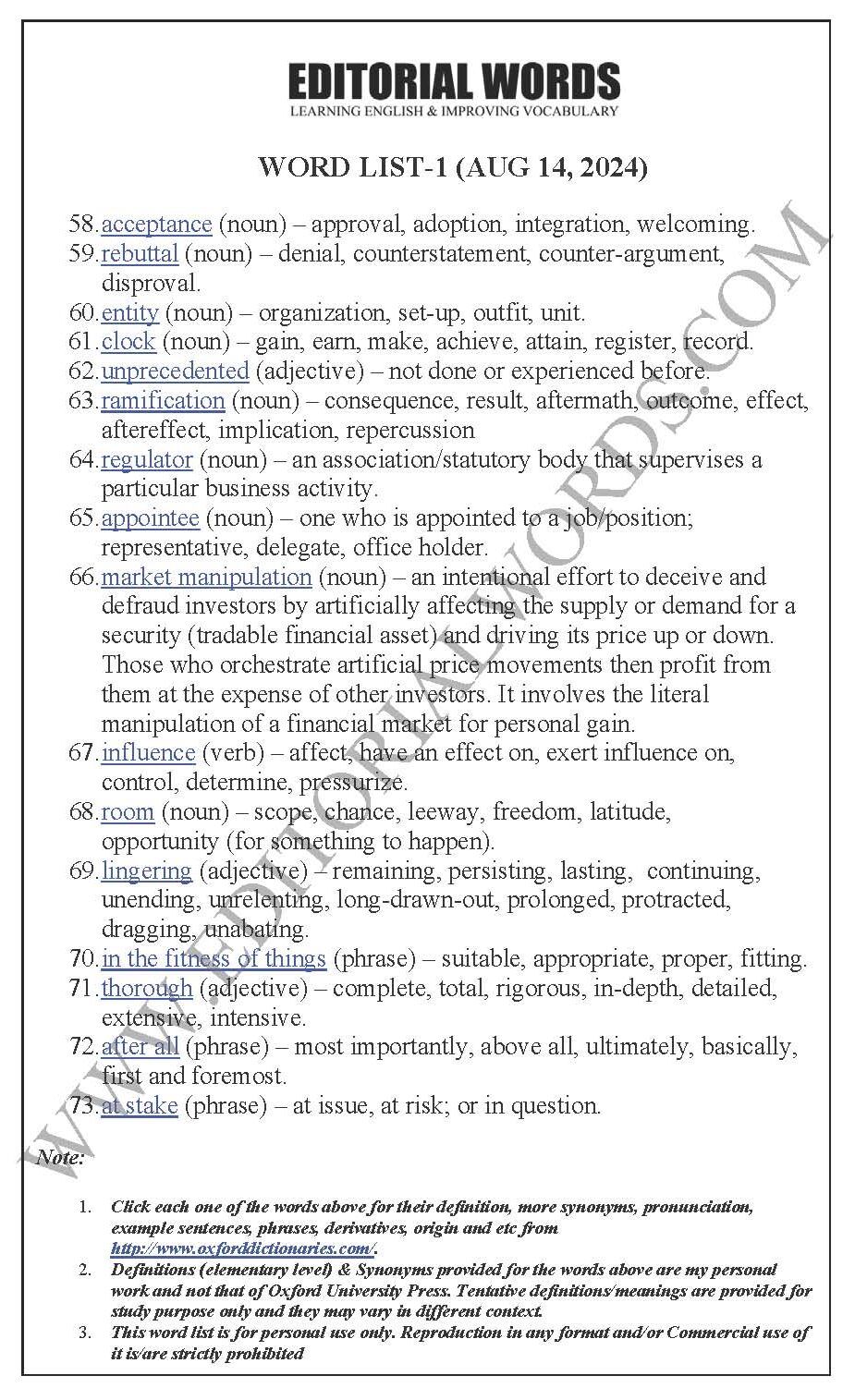The Hindu Editorial (Step down) – Aug 14, 2024
To read this article, click “The Hindu”.
This preview is provided here with permission.
Courtesy: The Hindu
The Hindu Editorial (Step down) – Aug 14, 2024:
- step down (verb) – give up a job or position; leave, quit, resign, retire, stand down, call it a day.
- uphold (verb) – confirm, endorse, justify, support, sustain, maintain, continue, keep up, protect, preserve.
- integrity (noun) – righteousness, uprightness, morality, probity, honesty, fairness.
- Securities and Exchange Board of India (SEBI) (noun) – It was established on April 12, 1992 in accordance with the provisions of the Securities and Exchange Board of India Act, 1992. It is the regulator of the securities and commodity market in India owned by the Government of India.
- for the sake of (phrase) – in the interest of, for the benefit of, for the advantage of, in the wake of, in the name of, in favour of (without any specific cause or reason).
- fair (adjective) – just, equitable, non-partisan, unbiased, impartial, honest, upright.
- securities (noun) – a range of investments (like shares, holdings, equities, bonds).
- securities (noun) – investments, shares, holdings, equities, bonds; securities (shares) of a company formally admitted to the trading platform of the (Stock) Exchange.
- securities market (noun) – stock market, equity market, share market (a stock is a security, but every security is not a stock).
- regulation (noun) – supervision, overseeing, monitoring, inspection; control, direction, guidance.
- oversight (noun) – supervision, inspection, surveillance, administration, management, handling, overseeing.
- come under (phrasal verb) be subject to.
- scrutiny (noun) – examination, inspection, investigation.
- establish (verb) – set up, start, begin, initiate, create, form, put in place.
- statutory (adjective) – regulated/controlled by statute (rules or laws).
- statutory body or authority (noun) – it means a non-constitutional body which is set up by a parliament. Statutory bodies are authorized to pass the law and take the decision on the behalf of state or country. Statutory body has official permission for Legislation i.e. process of enacting laws. Cabinet resolution should be passed to establish this body.
- constitute (verb) – initiate, establish, start, begin, initiate, create, form, organize, put in place.
- non-statutory (adjective) – another term for common law. Non-statutory bodies are not regulated by law. They get their powers from an executive order issued by the central government.
- body (noun) – entity, organization, institution, system, structure.
- resolution (noun) – a form in which a legislative body expresses an opinion or a purpose with respect to a given matter or topic (that is temporary in nature).
- allegation (noun) – charge, accusation, indictment.
- bias (noun) – prejudice, partiality, favouritism, unfairness, discrimination.
- conflict of interest (noun) – a situation in which a person cannot do his/her job fairly because he/she has the power to decide something in a way that would be to his/her advantage, although this may not be the best decision.
- (high) stakes (noun) – (high-risk) competition, contest, battle, challenge.
- stock market (noun) – a place where shares of pubic listed companies are traded; share market, equity market.
- powerhouse (noun) – a person/organisation/country/state with a lot of energy, power & influence.
- put in place (phrase) – establish, initiate, set up, start, begin, create, form.
- in place (phrase) – in order, established, arranged.
- robust (adjective) – strong, powerful.
- checks and balances (plural noun) – a system in which all departments of a government organization have right to amend/limit the powers of the other departments in order to avoid dominance of one department.
- constantly (adverb) – continually, continuously, perpetually.
- evolve (verb) – develop, progress, advance, expand, transform.
- reputation (noun) – good name, position, standing, status, eminence.
- reliable (adjective) – dependable, trustworthy, authentic, steadfast, well built, well founded.
- accusation (noun) – charge, allegation.
- level (verb) – direct a accusation.
- short-seller (noun) – a person who sells a stock that he/she doesn’t own.
- short selling (noun) – In SEBI’s words, short selling is the selling of a stock that the seller does not own at the time of trade. Short seller is a person who sells a stock that he/she doesn’t own.
- Hindenburg Research LLC (noun) – it is an investment research firm with a focus on activist short-selling founded by Nathan Anderson in 2017 and based in New York City.
- conduct (noun) – management, regulation, running, managing, controlling.
- ongoing (adjective) – in progress, under way, going on, continuing, happening, current.
- infrastructure (noun) – the basic physical or organisational structure or framework that a country or organization needs in order to function properly. For a whole nation, it includes all the physical systems such as buildings, roads & railways networks, utilities, etc.
- Fast-moving consumer goods (FMCG) (noun) – also called consumer packaged goods (CPG), refer to products that are highly in-demand, sold quickly, and affordable.
- major (noun) – a major organization/company; conglomerate.
- alleged (adjective) – supposed, so-called, claimed, professed, reported, ostensible.
- manipulation (noun) – falsification, misinformation, misreporting, misstatement, misrepresentation.
- malfeasance (noun) – deception, duplicity, lying, falseness, falsehood, untruthfulness wrongdoing, misconduct (particularly by a public official).
- cast a shadow on/over (phrase) – to make people feel less happy, to make situation appear less good or hopeful; disappoint, let down, discourage, demoralize, wear down.
- conflict (noun) – dispute, disagreement.
- obscure (adjective) – unclear, uncertain, unknown, doubtful, mysterious.
- offshore (adjective) – registered/situated at foreign country to take advantage of lower taxes or less regulation.
- tax haven (noun) – a country that imposes/charges/levies low tax rates on certain economic activities, especially to attract wealthy individuals and (foreign) businesses.
- allegedly (adverb) – ostensibly, supposedly, reportedly, presumably.
- prominent (adjective) – important, notable, famous, well known.
- SEBI-regulated (adjective) – controlled by SEBI.
- claim (verb) – state, declare, insist, affirm, assert, attest (without proof).
- dormant (adjective) – inactive, passive, inoperative.
- acceptance (noun) – approval, adoption, integration, welcoming.
- rebuttal (noun) – denial, counterstatement, counter-argument, disproval.
- entity (noun) – organization, set-up, outfit, unit.
- clock (noun) – gain, earn, make, achieve, attain, register, record.
- unprecedented (adjective) – not done or experienced before.
- ramification (noun) – consequence, result, aftermath, outcome, effect, aftereffect, implication, repercussion
- regulator (noun) – an association/statutory body that supervises a particular business activity.
- appointee (noun) – one who is appointed to a job/position; representative, delegate, office holder.
- market manipulation (noun) – an intentional effort to deceive and defraud investors by artificially affecting the supply or demand for a security (tradable financial asset) and driving its price up or down. Those who orchestrate artificial price movements then profit from them at the expense of other investors. It involves the literal manipulation of a financial market for personal gain.
- influence (verb) – affect, have an effect on, exert influence on, control, determine, pressurize.
- room (noun) – scope, chance, leeway, freedom, latitude, opportunity (for something to happen).
- lingering (adjective) – remaining, persisting, lasting, continuing, unending, unrelenting, long-drawn-out, prolonged, protracted, dragging, unabating.
- in the fitness of things (phrase) – suitable, appropriate, proper, fitting.
- thorough (adjective) – complete, total, rigorous, in-depth, detailed, extensive, intensive.
- after all (phrase) – most importantly, above all, ultimately, basically, first and foremost.
- at stake (phrase) – at issue, at risk; or in question.
Note :
1. Click each one of the words above for their definition, more synonyms, pronunciation, example sentences, phrases, derivatives, origin and etc. from http://www.oxforddictionaries.com/.
2. Definitions (elementary level) & Synonyms provided for the words above are my personal work and not that of Oxford University Press. Tentative definitions/meanings are provided for study purposes only and they may vary in a different context.
3. This word list is for personal use only. Reproduction in any format and/or Commercial use of it is/are strictly prohibited.
The Hindu Editorial (Step down) – Aug 14, 2024:




“Phrasal Verbs” We Learnt Last Week
“Idioms & Phrases” We Learnt Last Week
“Important Definitions” We Learnt Last Week
Recent Word Lists For The Hindu Editorial Articles

Not since the Harshad Mehta scam of 1992 has India’s securities regulations and oversight come under such scrutiny. The Securities and Exchange Board of India (SEBI), which was established as a statutory body that year —… For further reading, visit “The Hindu”. Below is today’s word list-1 for The Hindu Editorial (Step down) – Aug 14, 2024.